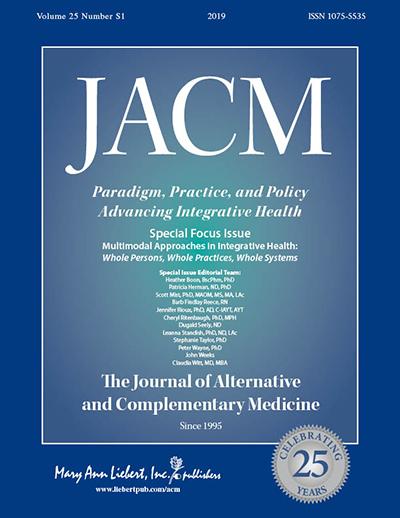
Credit: Mary Ann Liebert, Inc., publishers
New Rochelle, NY, March 18, 2019– Two decades ago, the popular movement for integrative health practices prompted researchers to advance “whole systems research” (WSR). As dominant medical delivery moves to embrace Triple Aim outcomes, a remarkable convergence is apparent. This convergence is at the center of the philanthropically-funded Special Issue on Multimodal Approaches in Integrative Health: Whole Persons, Whole Practices, Whole Systems published in JACM, The Journal of Alternative and Complementary Medicine, a peer-reviewed publication from Mary Ann Liebert, Inc., publishers, dedicated to paradigm, practice, and policy advancing integrative health. Click here to read the special issue free on the JACM website.
This special issue was led by a 12-person international editorial advisory team and was developed in partnership with the global organization of researchers in traditional, complementary, alternative and integrative medicine and health, ISCMR. The convergence theme relative to whole person, health-focused, patient-centered, individualized, team-based outcomes is introduced in “Values Align for Researching Whole Systems: A Reflective Overview of the Special Issue” from Advisory Team members and whole systems research pioneers Heather Boon, PhD, University of Toronto (Canada), Cheryl Ritenbaugh, PhD, University of Arizona (Tucson), and Editor-in-Chief John Weeks.
The body of whole systems research (WSR) is given its first thorough review in the monumental “Whole Systems Research Methods in Health Care: A Scoping Review,” from a team lead by Nadine Ijaz, PhD, University of Toronto (Canada), Jennifer Rioux, PhD, Integral Ayurveda and Yoga Therapy (Chapel Hill, NC), Charles Elder, MD, MPH, Kaiser Northwest Permanente (Portland, OR), and Weeks. The paper examined 41 WSR clinical research exemplars reviewed from across 13 TCIM disciplines to map the range and methodological characteristics of WSR studies. The authors conclude that “WSR has emerged as a maturing scholarly discipline” that is “distinguished by its patient-centered salutogenic focus and engagement with nonbiomedical diagnostic and treatment frameworks.” In a related commentary, a similar team, led by Elder, focused on the convergence theme: “Convergent Points for Conventional Medicine and Whole Systems Research: A User’s Guide.”
This issue drew a diverse set of papers focused on shifting the whole systems of pain treatment toward integrative chronic pain models – in part to combat the US reliance on opioids and pharmacologic approaches. Research teams from multiple organizations contributed papers reporting whole person change models in diverse contexts: University of California San Francisco (primary care safety net clinics), US Veterans Administration (whole system), Oregon Medicaid (federally qualified health centers), University of Vanderbilt (outpatient academic medicine), and University of North Carolina, Chapel Hill (pediatric hospital). It also includes new exemplars of multimodal, WSR methods from Harvard Medical School (multimodal back pain), Ottawa Integrative Cancer Center (multicenter pragmatic trial), Integral Ayurveda and Yoga (obesity) and from a team associated with US Naval Hospital at Camp Lejune (back pain).
“One key goal was to explore ways whole systems research related to the popular movement for integrative health might both inform and contribute to medicine’s engagement with health and other whole-person-oriented, value-based outcomes,” says JACM Editor-in-Chief John Weeks, johnweeks-integrator.com (Seattle, WA), adding: “Our Special Issue Editorial Advisory Team cast a wide net in our call for papers – and we believe the catch is compelling!”
This special issue was supported by a philanthropic grant and was engaged with the fiscal partnership of Bastyr University, Bothell, WA, offering programs in areas including naturopathy, acupuncture, and Oriental medicine, nutrition, herbal medicine, Ayurvedic medicine, psychology, and midwifery.
###
About the Journal
JACM, The Journal of Alternative and Complementary Medicine is a monthly peer-reviewed journal published online with open access options and in print that is dedicated to research on paradigm, practice and policy advancing integrative health. Led by John Weeks (johnweeks-integrator.com), the co-founder and past Executive Director of the Academic Collaborative for Integrative Health, JACM publishes human clinical trials, observational studies, systematic reviews and commentary intended to help healthcare professionals, delivery organization leaders, policy-makers and scientists evaluate and integrate therapies into patient care protocols, payment strategies and appropriate protocols. Complete tables of content and a sample issue may be viewed on the JACM website.
About the Publisher
Mary Ann Liebert, Inc., publishers is a privately held, fully integrated media company known for establishing authoritative medical and biomedical peer-reviewed journals, including OMICS: A Journal of Integrative Biology, Journal of Computational Biology, New Space, and 3D Printing and Additive Manufacturing. Its biotechnology trade magazine, GEN (Genetic Engineering & Biotechnology News), was the first in its field and is today the industry’s most widely read publication worldwide. A complete list of the firm’s more than 80 journals, newsmagazines, and books is available on the Mary Ann Liebert, Inc., publishers website.
Media Contact
Kathryn Ryan
[email protected]
Original Source
https:/




